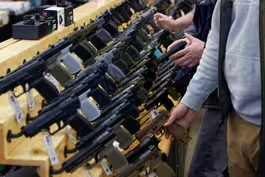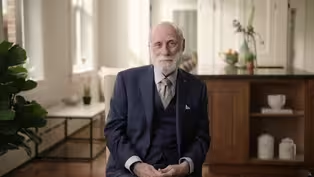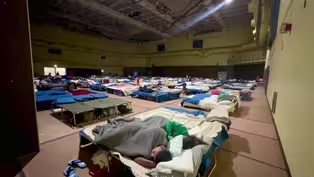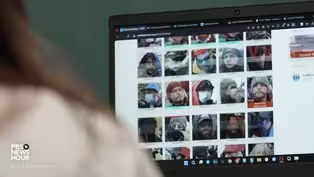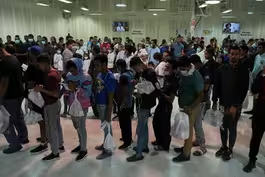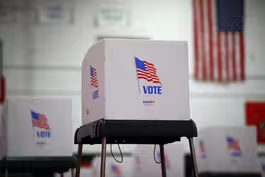
Killing of Hamas leader deepens concerns of war spreading
Clip: 1/3/2024 | 9m 59sVideo has Closed Captions
Assassination of Hamas leader in Lebanon deepens concerns of broader regional conflict
Fears of a widening war in the Middle East are back on boil after Tuesday's killing of a top Hamas leader in Beirut, Lebanon. Israel has not acknowledged any role in the drone attack, but it spent Wednesday awaiting possible retaliation by Hezbollah, the powerful, Lebanese militia backed by Iran. Amna Nawaz discussed what this means for the region with Randa Slim of the Middle East Institute.
Problems playing video? | Closed Captioning Feedback
Problems playing video? | Closed Captioning Feedback
Major corporate funding for the PBS News Hour is provided by BDO, BNSF, Consumer Cellular, American Cruise Lines, and Raymond James. Funding for the PBS NewsHour Weekend is provided by...

Killing of Hamas leader deepens concerns of war spreading
Clip: 1/3/2024 | 9m 59sVideo has Closed Captions
Fears of a widening war in the Middle East are back on boil after Tuesday's killing of a top Hamas leader in Beirut, Lebanon. Israel has not acknowledged any role in the drone attack, but it spent Wednesday awaiting possible retaliation by Hezbollah, the powerful, Lebanese militia backed by Iran. Amna Nawaz discussed what this means for the region with Randa Slim of the Middle East Institute.
Problems playing video? | Closed Captioning Feedback
How to Watch PBS News Hour
PBS News Hour is available to stream on pbs.org and the free PBS App, available on iPhone, Apple TV, Android TV, Android smartphones, Amazon Fire TV, Amazon Fire Tablet, Roku, Samsung Smart TV, and Vizio.
Providing Support for PBS.org
Learn Moreabout PBS online sponsorshipThere is fresh concern tonight Middle East after Tuesday's killing of# a top Hamas leader in Beirut, Le AMNA NAWAZ: Israel has not acknowledged any# role in the attack, but it's spent today## awaiting possible retaliation by Hezbollah,# the powerful Lebanese militia backed by Iran In Lebanon today, the leader# of Hamas-allied Hezbollah,## Hassan Nasrallah, delivered a grave warning.
HASSAN NASRALLAH, Hezbollah Leader# (through translator): If the Israeli## enemy thinks about going to war agai no rules and no safeguards.
Yesterday's# crime was severe.
It will not go unpunishe AMNA NAWAZ: That in response to the# assassination of senior Hamas leader## Saleh al-Arouri at his home in Beirut# by a suspected Israeli drone strike.
Yesterday, the head of Hamas' political# wing, Ismail Haniyeh, lambasted the killing.
ISMAIL HANIYEH, Chairman, Hamas Political# Bureau (through translator): We affirm that## the assa Lebanese lands is a complete terrorist act,# a violation of Lebanon's sovereignty and an## expansion of Israel's hostility# against our people and nation.
AMNA NAWAZ: Israel has not publicly claimed# responsibility, but today, Mossad spy agency## chief David Barnea pledged to hunt down# everyone involved in the October 7 attacks.
DAVID BARNEA, Head of Israeli Mossad# (through translator): The Mossad is## committed to settling the score border on October 7.
It will take time, but# we will get them, no matter where they are.
AMNA NAWAZ: It's all deepening concerns of a# broader regional conflict.
Israel and Hezbollah## have been exchanging fire at the Lebanese border# since the war began.
And Iran-backed Houthi rebels## in Yemen have targeted several commercial# vessels in the Red Sea headed for Israel.
International shipping company Maersk announced# yesterday it's suspending all shipping traffic## following a weekend attack on one of its# vessels.
In the occupied West Bank today,## protests erupted over the killing# of al-Arouri.
And in the packed## encampments of war-torn Gaza, Palestinians# say the assassination will not deter Hamas.
MAN (through translator): If Saleh al-Arouri# is gone, a million others will emerge and## stronger than him.
Things won't stop# because of al-Arouri, God willing.
AMNA NAWAZ: Meanwhile, the U.S.# declassified intelligence yesterday## that corroborates Israeli claims that# Hamas used Gaza's largest hospital,## Al Shifa, to hold some Israeli hostages and# house command infrastructure.
It was raided## by the IDF in November, sparking widespread# condemnation by humanitarian organizations.
Back in Gaza, the southern town of Rafah# has turned into one massive tent city for## displaced Gazans.
There is no heat and no real# shelter from the cool, wet Mediterranean winter.
Zayda Al-Breem constantly has to clear water# off the tent roof so it doesn't collapse.
ZAYDA AL-BREEM, Displaced Gazan (through# translator): Displacement is somewhat## bearable, but displacement and on e covers this child and brings that# one closer.
A woman just asked me## for a desk pan to dispose of the# rainwater, but I don't have one.
AMNA NAWAZ: IDF bombings on areas# they fled continue.
Chaos erupted## across parts of the central and southern# strip today after devastating airstrikes,## a new year bringing new death, new destruction,# and new questions for what comes next.
And one of the biggest concerns as the war goes# on is the prospect of the conflict widening.
To decode what this means for the# region, we turn now to Randa Slim,## director of the Conflict Resolution and Track## II Dialogues Program at the Middle East# Randa, it's good to see you.
Tell us a little b What should we know about him?
And# what does his death mean for Hamas?
RANDA SLIM, Middle East Institute: Saleh al-Arouri# is the chair of the political bureau of Hamas.
He is also in charge of Hamas operations in# the West Bank.
He was one of the founders## of the military wing of Hamas, the Izzedine# al-Qassam Brigades.
And, more importantly, he's## also somebody who has been closely involved in the# relationship between Iran, Hamas, and Hezbollah.
There has been a rift between Hamas on one hand# and Iran and Hezbollah on the other after the## beginning of the Civil War in Syria and Hamas'# decision to side not with the Bashar al-Assad## regime, but with the opposition.
And, as a# result, Hamas' leaders left Damascus at the time.
And so, in the last five years, Saleh# al-Arouri has been involved in healing## that rift, in leading negotiations# between Hamas, Iran, and Hezbollah.
AMNA NAWAZ: So, Randa, what's the impact of# al-Arouri's death on Hamas as an organization?
RANDA SLIM: Hamas is the type of organization# that can survive the death of al-Arouri,## as it has done in the past by# surviving the death of other## leaders who were assassinated# over the years by Israel.
And so I think it's going to be, in# the short term -- organizationally,## it's going to be difficult, but,# in the medium term to long term,## I think Hamas will be able to survive his death,# and it's not going to affect its operation.
Now, he was also involved, he has been involved# in the negotiation over the Israeli hostages## as representative of a wing of Hamas.
And# so how this attack and this assassination## affect those negotiations is yet to be seen.# It might derail them.
It might delay them.
AMNA NAWAZ: But, as you know, we're# constantly evaluating what every move## means for whether or not this conflict# could broaden into the wid If al-Arouri is in Lebanon as sort of the liaison,# the connection between Hamas and does his death mean that you see Hezbollah# entering the war in fuller force now?
RANDA SLIM: No, not at all.
I think Hezbollah into a larger escalation, into an all-out war.# Nasrallah Hezbollah, Hezbollah secretary-general,## in his speech today paid his condolences to# family of al-Arouri, to Hamas, but he did## not go into detail about this, dragging# them into any kind of major escalation.
In fact, to the contrary, he said that# they are losing so many fighters in the## south of Lebanon because they have been# calculating their move on that front very## carefully in order not to give Israel any# kind of reason to launch an all-out war.
However, he said that, if Israel were to drag us# into this war, the response is going to be great,## and there will be no limits to this response.# And he said Israel will know what I mean.
AMNA NAWAZ: Randa, what does that mean# to you when they say if Israel was to## drag us into that war?
What line# do you think needs t RANDA SLIM: You know, there are sublines that# are getting crossed every day.
And like today, there are unconfirmed reports# yet of a senior Hezbollah commander has been## targeted and killed in Naqoura in south# of Lebanon.
I think more of this kind of## assassination targeting Hezbollah in Lebanon,# especially in Beirut's southern suburbs, is,## I think, the red line that# Hezbollah will not tolerate.
Arouri was a Hamas member, was# a Palestinian.
Despite the fact## that he was killed and assassinated# in Hezbollah's security perimeter,## in Beirut's southern suburbs, I still think# this is not a major red line for Hezbollah.## However, Nasrallah said in his speech, his# assassination will not go without response.
But, of course, very much in line# with their modus operandi, he did not,## of course, say anything about what kind of# response and when that response will happen.
AMNA NAWAZ: We should point out Israel has not## publicly claimed responsibility bu t they have repeatedly said they will go# after Hamas leadership wherever they are.
Do you see the possibility of Israel carrying# out targeted assassinations in other countries,## like Turkey or Qatar, where# we know Hamas leadership live?
RANDA SLIM: The intelligence services# in Turkey have already issued a warning## to Israel not to carry out the# assassination their territory.
I think it's going to be a little bit difficult# for Israel to do it on Qatari territory,## especially as they need Qatar's mediation# in the hostage file between them and Hamas,## at least until all hostages are released,# all Israeli hostages are released.
I think they will continue to target them in# Lebanon.
But after al-Arouri's assassination,## Hamas leaders might either leave Lebanon# or will take extra security precautions.
I think the fear -- the fact# that the assassination happened## in Beirut's southern suburbs also# raises a lot of concerns about the## security of Hezbollah leaders who# live and work in that area as well.
AMNA NAWAZ: That is Randa Slim,# director of conflict resolution at## the Middle East Institute, joining us from Beirut.
Randa, thank you so much.
Good to see you.
RANDA SLIM: Thank you very much.
2024 brings new gun restrictions in several states
Video has Closed Captions
Clip: 1/3/2024 | 4m 3s | 2024 brings new gun restrictions in several states (4m 3s)
A Brief But Spectacular take on the future of the internet
Video has Closed Captions
Clip: 1/3/2024 | 3m 11s | A Brief But Spectacular take on the future of the internet (3m 11s)
Chicago leaders ask White House for help with migrant surge
Video has Closed Captions
Clip: 1/3/2024 | 6m 40s | Chicago leaders demand help from White House to deal with surge of migrants in city (6m 40s)
Citizen investigators help FBI track down Jan. 6 rioters
Video has Closed Captions
Clip: 1/3/2024 | 10m 28s | How citizen investigators are helping the FBI track down Jan. 6 rioters (10m 28s)
House Republicans visit border amid immigration negotiations
Video has Closed Captions
Clip: 1/3/2024 | 5m 17s | House Republicans visit southern border as immigration negotiations continue in Washington (5m 17s)
How GOP campaigns are courting Iowa and New Hampshire voters
Video has Closed Captions
Clip: 1/3/2024 | 8m 37s | How GOP campaigns are courting Iowa and New Hampshire voters in the final weeks (8m 37s)
Providing Support for PBS.org
Learn Moreabout PBS online sponsorship
- News and Public Affairs

FRONTLINE is investigative journalism that questions, explains and changes our world.

- News and Public Affairs

Amanpour and Company features conversations with leaders and decision makers.
Urban Consulate Presents











Support for PBS provided by:
Major corporate funding for the PBS News Hour is provided by BDO, BNSF, Consumer Cellular, American Cruise Lines, and Raymond James. Funding for the PBS NewsHour Weekend is provided by...
